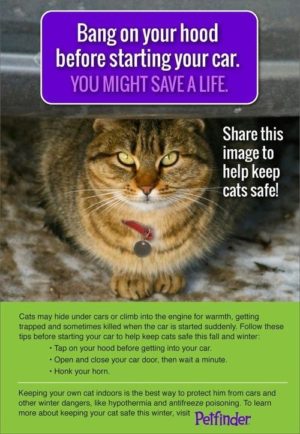 Cats & Cars: The warmth of a car’s motor is tempting to outdoor animals, especially cats. Tap your car’s hood a few times and wait a few minutes before starting your car. This extra precaution may save the life of a cat or a litter of kittens!
Cats & Cars: The warmth of a car’s motor is tempting to outdoor animals, especially cats. Tap your car’s hood a few times and wait a few minutes before starting your car. This extra precaution may save the life of a cat or a litter of kittens!
The danger of Antifreeze – Unfortunately though it may taste delicious to your cat or dog it is extremely dangerous to pets. It contains ethylene glycol, an ingredient that can be fatal to dogs and cats if not treated immediately. According to the Pet Poison Helpline the three stages of antifreeze poisoning in dogs and cats:
- Stage 1: This occurs within 30 minutes to 12 hours, and looks similar to alcohol poisoning. Signs of walking drunk, drooling/hypersalivating, vomiting, seizuring, vomiting, and excessive thirst and urination are seen.
- Stage 2: This occurs 12-24 hours after a dog or cat has gotten into antifreeze, and signs of “alcohol” poisoning appear to resolve, when underlying severe internal damage is still occurring. Signs of drunkenness seem to improve, but signs of an elevated heart rate, increase breathing effort, and dehydration may start to develop.
- Stage 3: In cats, this stage occurs 12-24 hours after getting into antifreeze. In dogs, this stage occurs 36-72 hours after getting into antifreeze. During this stage, severe kidney failure is developing secondary to calcium crystals forming in the kidneys. Severe lethargy, coma, depression, vomiting, seizures, drooling, and inappetance may be seen.
